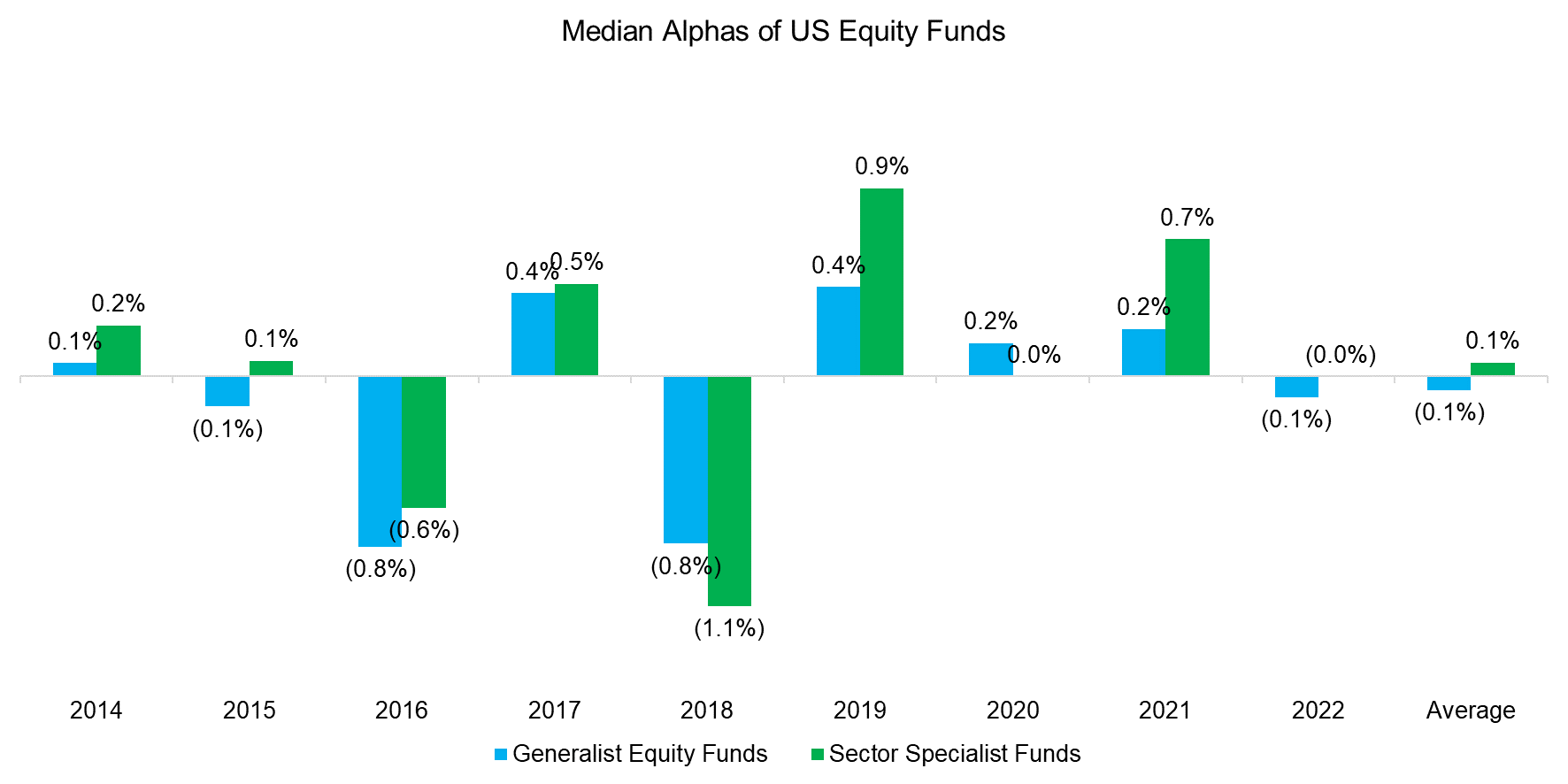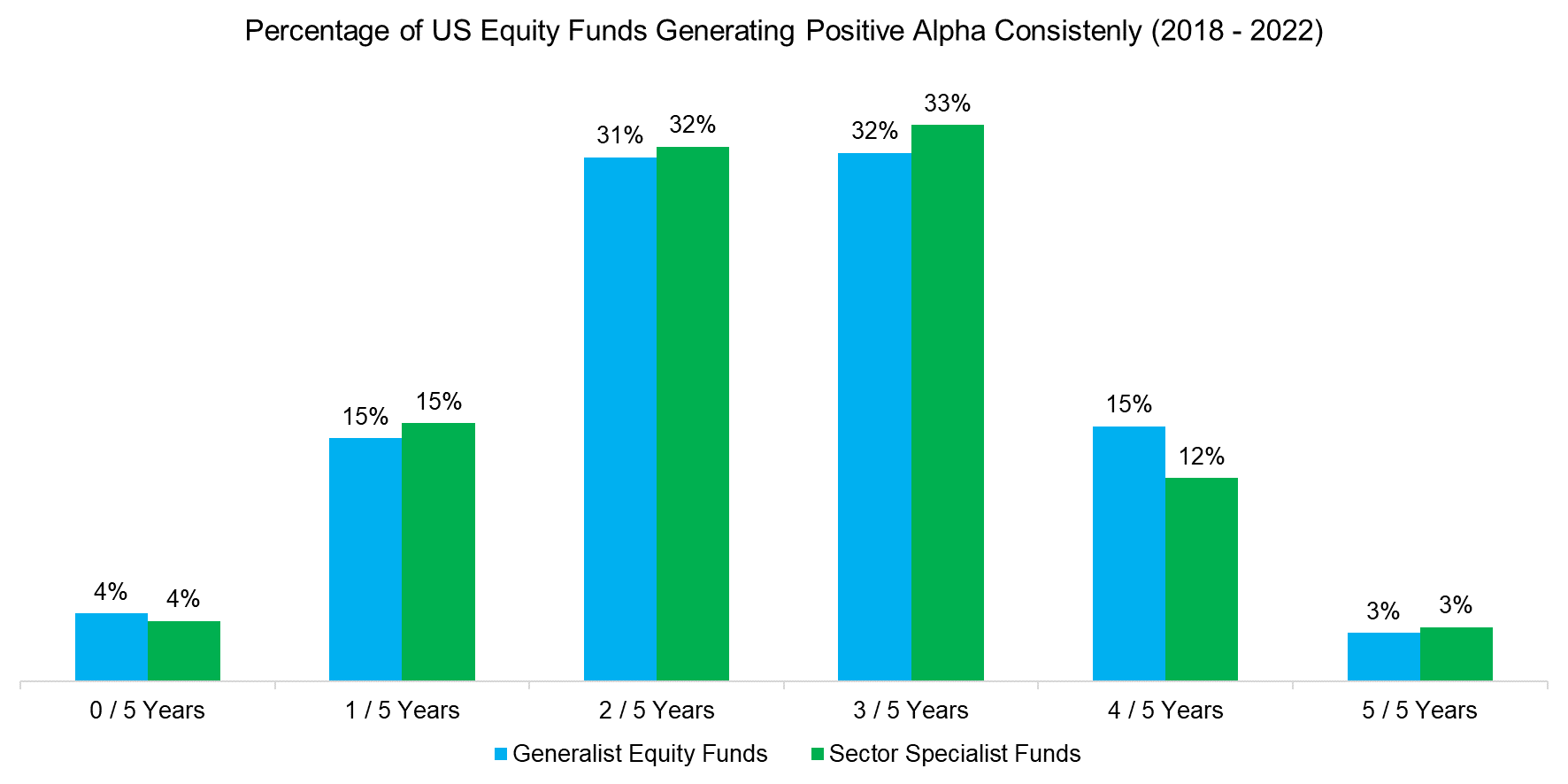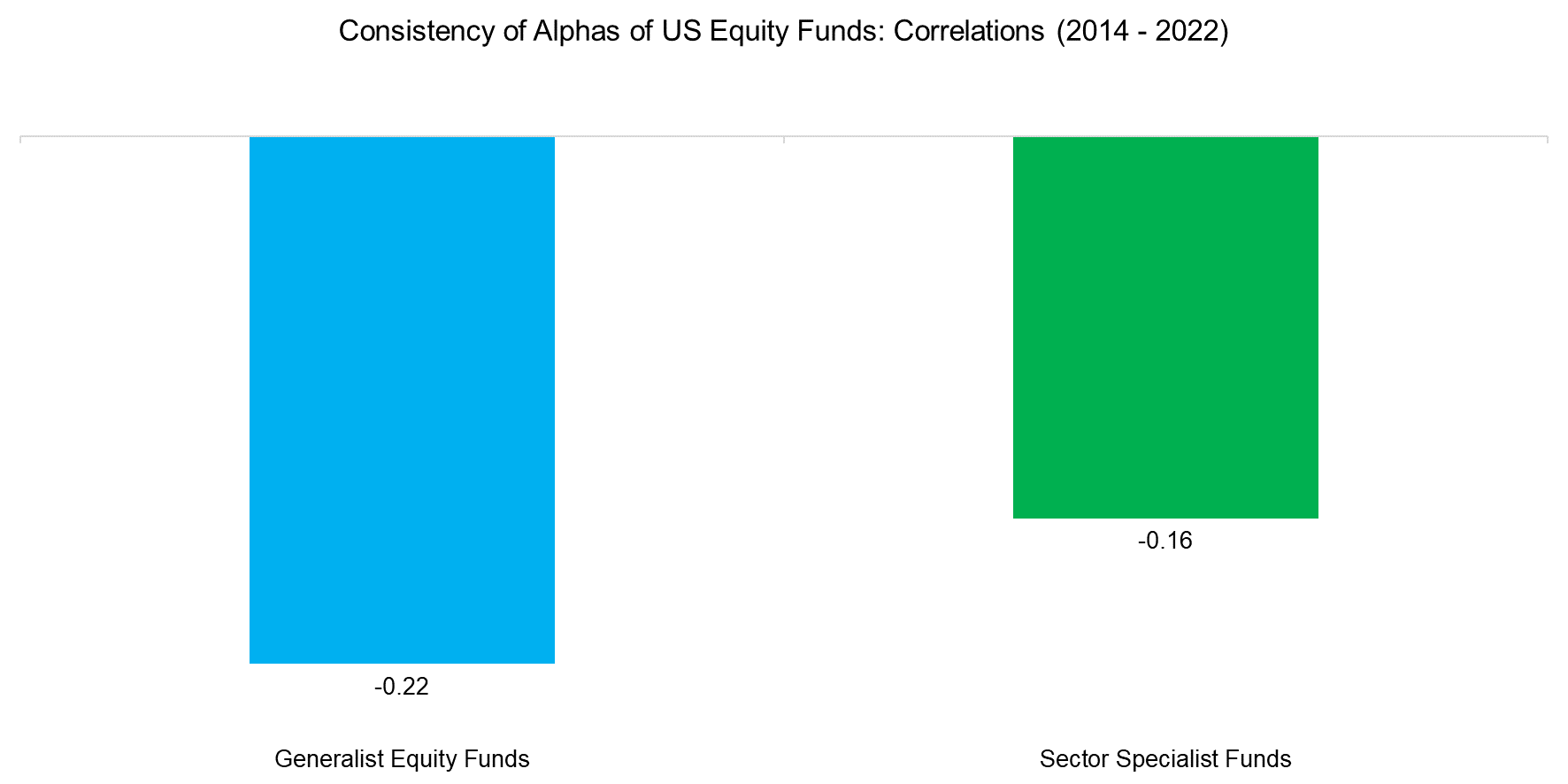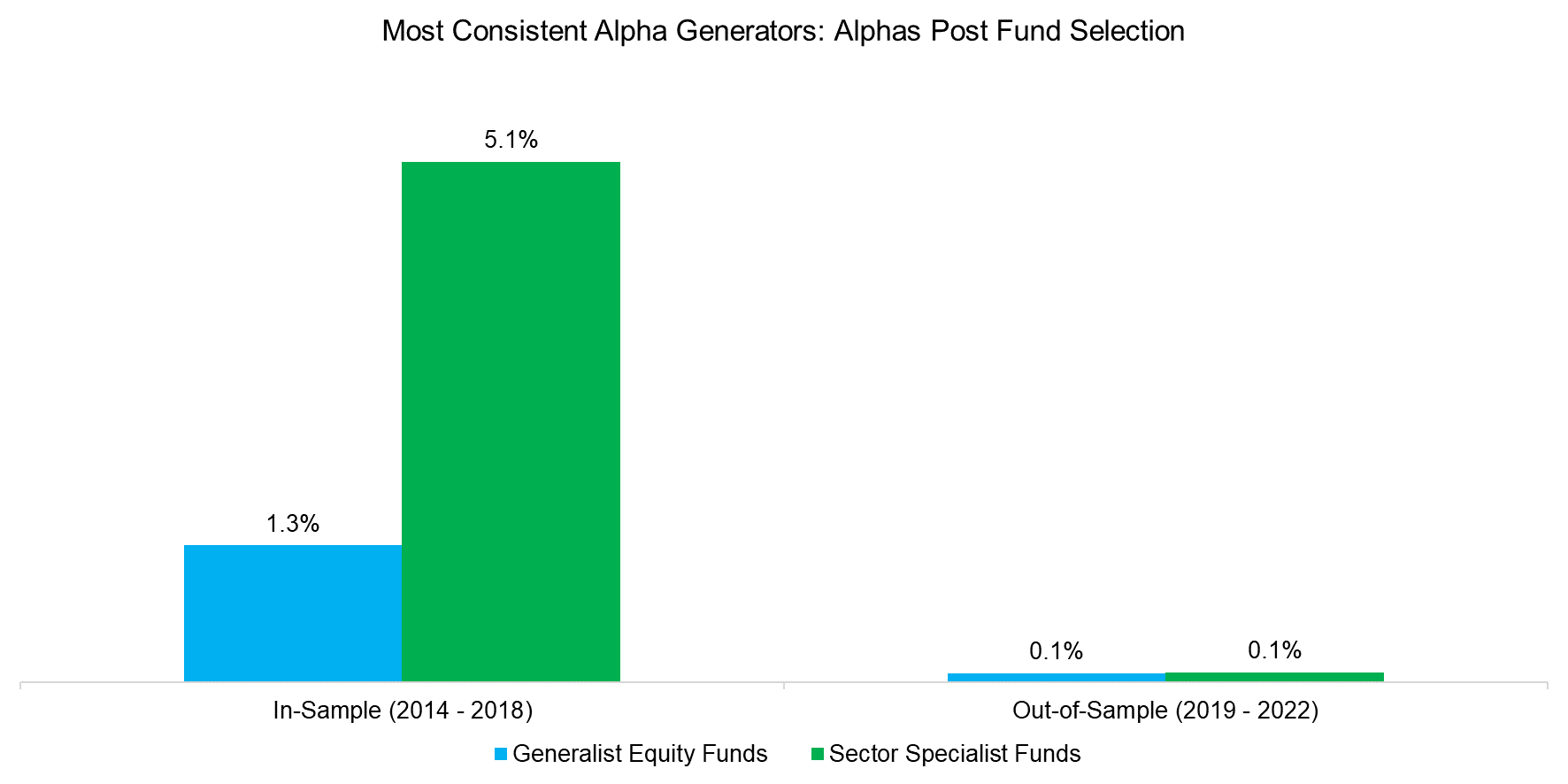Alpha Generation: Equity Generalists vs Sector Specialists
And the winner is?
May 2023. Reading Time: 10 Minutes. Author: Nicolas Rabener.
SUMMARY
- Neither equity generalists nor sector specialists have generated alpha on average
- There is no consistency in alpha generation by either type of fund manager
- The most consistent alpha generators produced no alpha out-of-sample
INTRODUCTION
When I joined Citigroup as an analyst in their mergers & acquisitions department in 2005, my career trajectory was to either become a sector specialist or a country generalist investment banker. The former would mean that I pick a sector like pharmaceuticals and advise companies within that on their M&A, IPOs, and financing options. The latter entailed the same work, but focus across sectors within a certain geography like the UK or Germany.
Stock analysts have the same choice and tend to focus on a broad market like the S&P 500 or on a sector like financials. In both cases, the objective is to generate alpha by beating their benchmarks. However, it is not clear which is the smarter career choice. A sector specialist acquires deep industry knowledge and becomes an expert on their covered companies, but is at the mercy of industry trends and the economic cycle, where certain sectors fall out of favor on a regular basis. In contrast, the generalist is a jack of all trades and can exploit sector rotations, or pursue a certain investment style like buying cheap or growth stocks across sectors.
Debating the pros and cons of such career choices can be endless, but we can simply measure who is more successful at fulfilling their objective. In this article, we will compare the alpha generation and consistency of equity generalists versus sector specialists.
UNIVERSE
We focus on all mutual funds and ETFs trading in the US and are defined as equity funds. First, we identify the most appropriate benchmark for each fund via a factor exposure analysis. We exclude any funds with an R2 of less than 0.7, which results in a universe of 2,529 funds, out of which 1,980 are generalist and 549 are sector funds.
Then we run a contribution analysis on an annual basis to explain what returns can be contributed to asset classes (equities, bonds, currencies, commodities) and factors (value, momentum, size, quality, and low volatility). The unexplained return is considered alpha.
We observe that the median alphas ranged from -1.1% to 0.9% per annum in the period from 2014 to 2022. On average, generalists lost -0.1%, while sector specialists created 0.1% of alpha. It is interesting that the trends in alpha generation were similar for both types of fund managers, eg both significantly destroyed value in 2016 and 2018, but created value in 2017 and 2019.
It is worth noting that we only included funds that are still trading today, which implies this analysis suffers from survivorship bias as the worst-performing funds have been liquidated. Practically this means the alphas are overstated and are lower in reality.

Source: Finominal
ALPHA CONSISTENCY
Next, we evaluate how consistently fund managers have generated alpha. We calculate the percentage of funds that have produced positive alphas each year in the period from 2018 to 2022, which highlights a symmetrical distribution that is almost identical for generalists and sector specialists. Approximately 3% of the funds generated positive alphas in each of the five years, but a similar proportion featured consistently negative alphas (read Less Efficient Markets = Higher Alpha?).

Source: Finominal
Computing the correlations of alphas of each fund from 2013 to 2022 highlights that the median correlation across all funds was -0.22 for generalists and -0.16 for sector specialists, which confirms that fund managers are not able to generate alpha consistently, regardless of their profile. This indicates that producing alpha is a function of luck rather than skill.

Source: Finominal
ALPHA MACHINES
However, it is not particularly insightful that the alpha is zero or negative on average. Equity markets are highly efficient and it has become incredibly difficult to have any kind of competitive edge. All professional investors have the same access to corporate management, research, news, data, technology, and so on.
The job of a fund selector is to identify the very select few funds that generate alpha consistently and hope these continue to do so. In order to evaluate this selection process, we identify the funds that produced positive alphas in each of the five years from 2014 to 2018, which 43 generalist and 17 sector specialist fund managers achieved.
The average in-sample alpha was 1.3% per annum for generalists and an impressive 5.1% for sector specialists, but the alpha shrank to essentially zero in the out-of-sample period from 2019 to 2022, further confirming that the alpha generation is random. This result is especially disappointing as fund managers often argue that they need volatility to create value, which was the case over the last four years given the COVID-19 crises and the bear market of 2022.

Source: Finominal
FURTHER THOUGHTS
Philip Tetlock, currently a professor at the University of Pennsylvania, highlighted in his book “Expert Political Judgment” in 2005 that experts are only marginally better at predicting than random guesses, which was based on 82,000 predictions by 284 experts over two decades.
This analysis has far fewer data points, but derives a similar conclusion. Expertise is overrated, which is painful to admit for someone who once was a sector specialist and now has evolved into a quantitative generalist.
RELATED RESEARCH
The Alpha Games: Technology Funds
Outperformance Ain’t Alpha
Less Efficient Markets = Higher Alpha?
Smart Beta vs Alpha + Beta
Alpha Generation: The Search for the Unexplainable
Sector vs Factor-based Benchmark Selection
Mirror, Mirror, on the Wall, which is the Fairest Benchmark of All?
Factor Exposure Analysis 101: Linear vs Lasso Regression
REFERENCED RESEARCH
S&P SPIVA Scorecards
ABOUT THE AUTHOR
Nicolas Rabener is the CEO & Founder of Finominal, which empowers professional investors with data, technology, and research insights to improve their investment outcomes. Previously he created Jackdaw Capital, an award-winning quantitative hedge fund. Before that Nicolas worked at GIC and Citigroup in London and New York. Nicolas holds a Master of Finance from HHL Leipzig Graduate School of Management, is a CAIA charter holder, and enjoys endurance sports (Ironman & 100km Ultramarathon).
Connect with me on LinkedIn or X.

